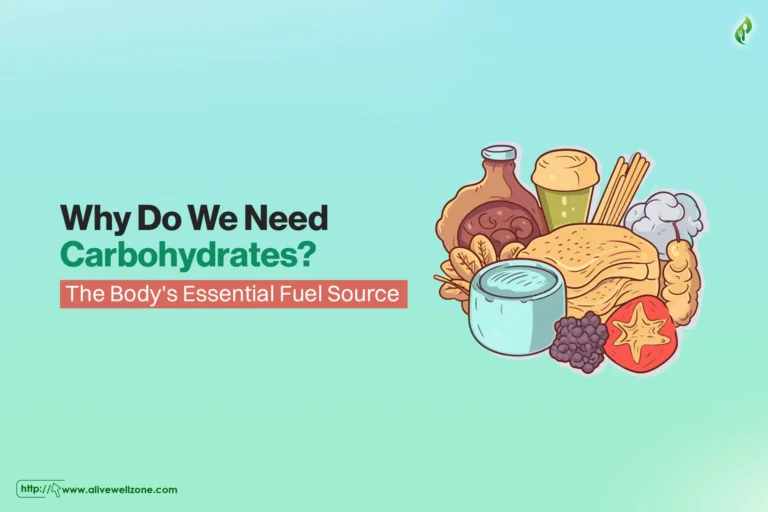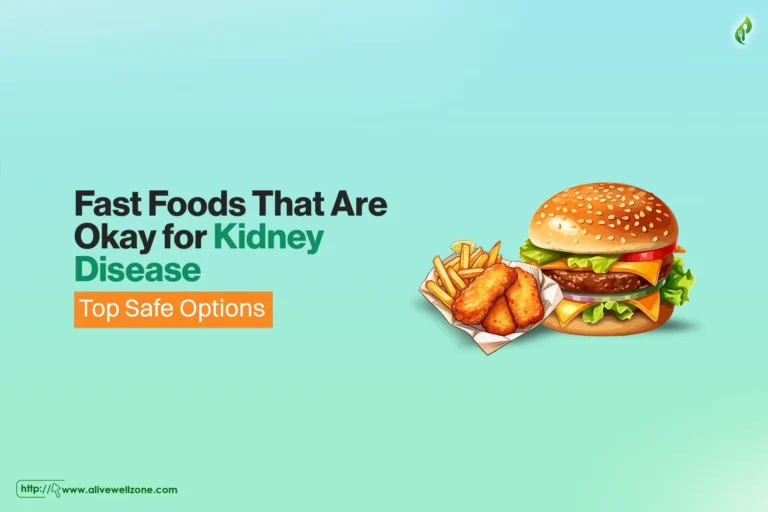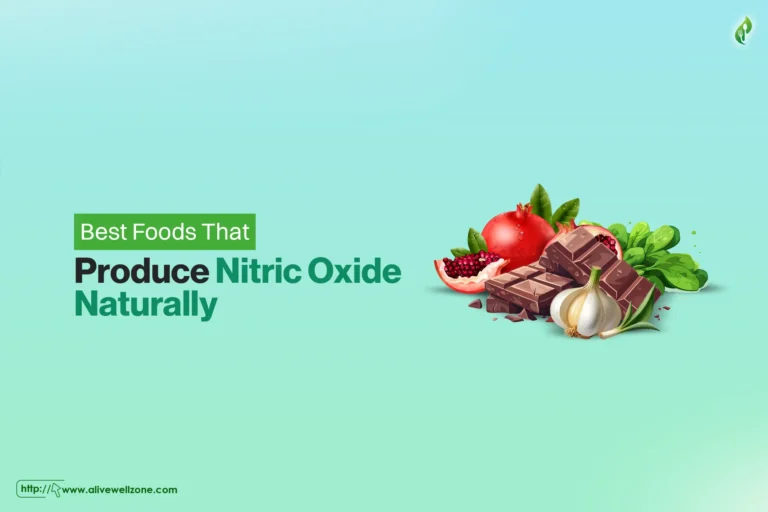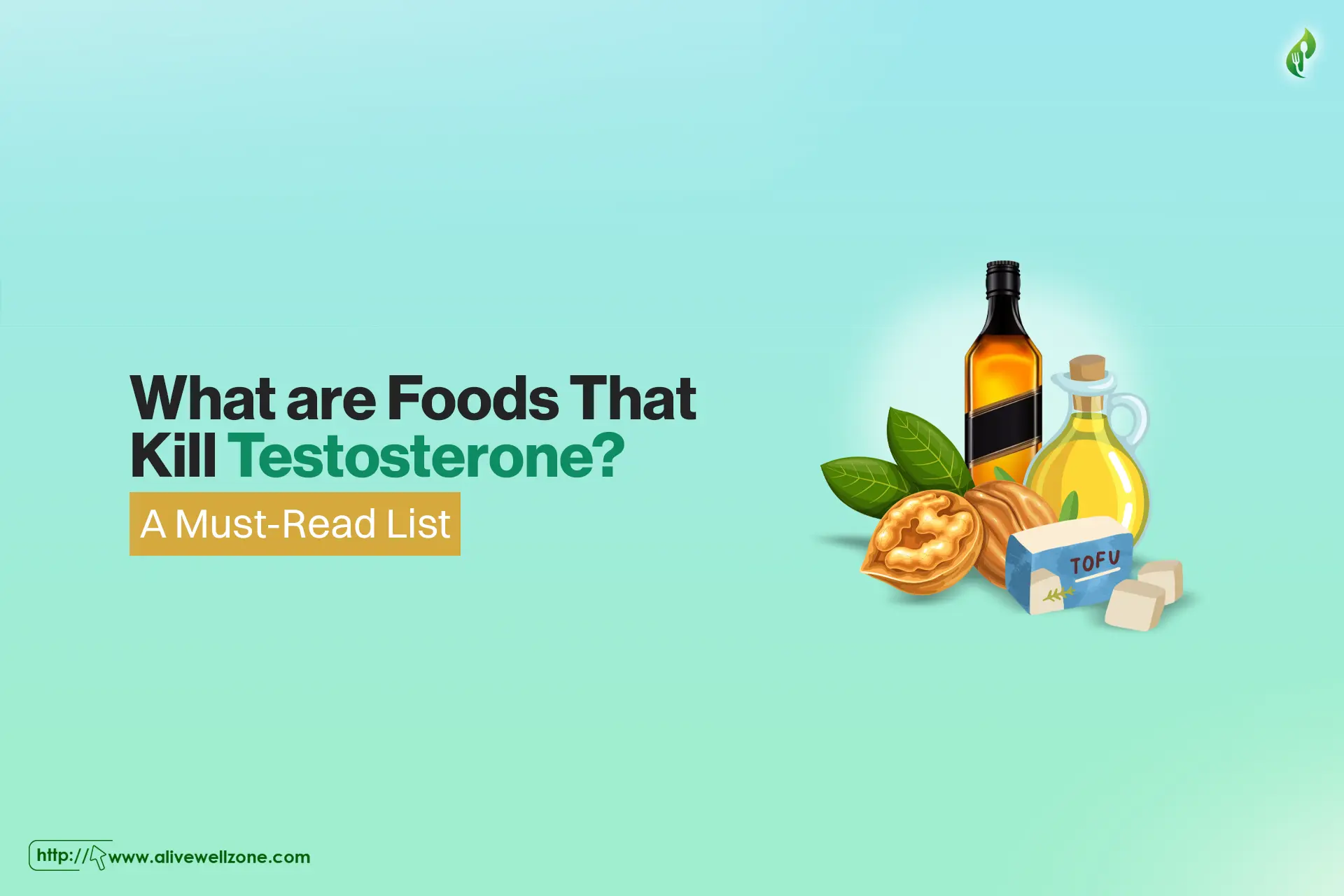
Are you concerned about your testosterone levels? Can certain foods affect your manhood? Many men are curious about what are foods that kill testosterone and their impact on health.
Well, there are foods that kill testosterone. And they’re alcohol, sugar, dairy products, soy, mint, flaxseeds, vegetable oils, licorice root, etc. Eating too much of these can disrupt hormone balance. So, limit them if you want to maintain healthy testosterone levels.
Aside from foods, we’ll discuss factors that reduce your testosterone. Plus, you’ll know about the symptoms of low testosterone and how you can increase this hormone naturally.
Key Takeaways
- Foods can lower testosterone: Foods like alcohol, dairy, sugar, trans fats, and soy can negatively impact testosterone levels. These foods can disrupt hormone balance and potentially lower testosterone production in men.
- Lifestyle factors: Age, stress, lack of physical activity, and certain health conditions like hypothyroidism and type 2 diabetes can also contribute to lower testosterone levels. Maintaining a healthy lifestyle is crucial to supporting hormone balance.
- Your diet and habits: A diet rich in healthy foods and regular exercise can help maintain or even boost testosterone levels naturally. Conversely, unhealthy eating and excessive alcohol or caffeine intake can have the opposite effect.
- Symptoms of low testosterone: Common signs include reduced sex drive, fatigue, weight gain, and emotional changes like depression. If you notice these symptoms, consider consulting a healthcare provider for advice and potential testing.
12 Foods That Kill Testosterone You Should Avoid
A good diet can help you feel better, and it might even increase your testosterone. However, some foods can reduce this hormone and have a terrible impact on your health.
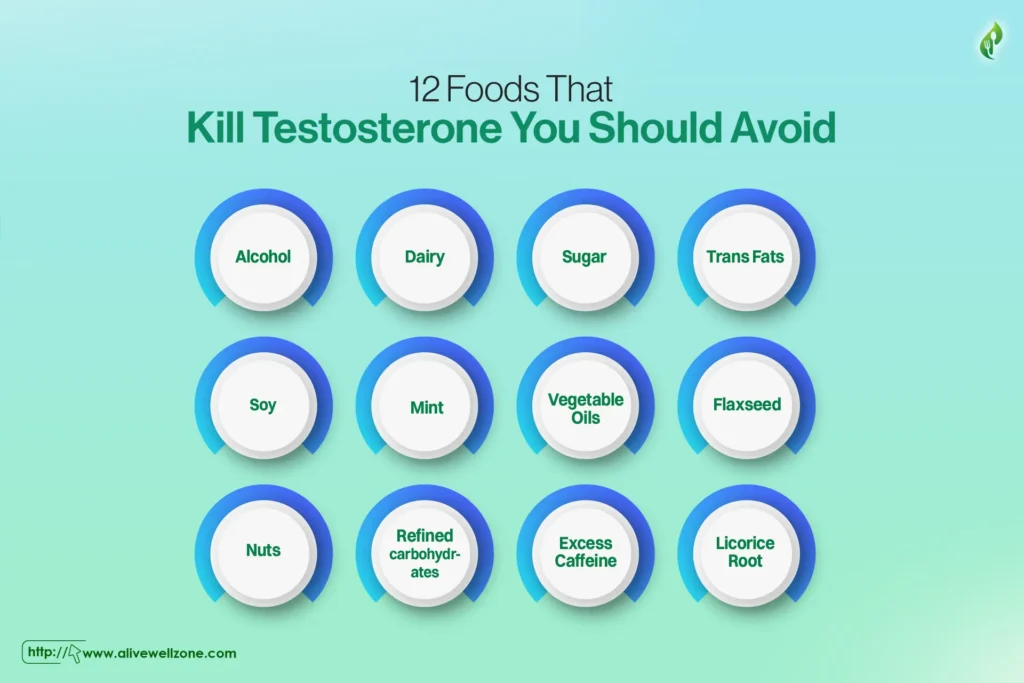
1. Alcohol
Drinking a little alcohol usually doesn’t quickly lower your testosterone. But drinking too much or for a long time might be linked to lower testosterone in men.
Studies published in Current Drug Abuse Review show that drinking a lot of alcohol often can lower testosterone. Even drinking too much at once can drop testosterone for a short time.
Heavy drinking can also make you gain weight, which can mess with your hormones. It’s unclear exactly how alcohol affects testosterone or sperm, but it’s clear what foods kill testosterone in a man including drinking habits.
So, instead of shots of booze, implement 12 healthy habits for a better life.
2. Dairy
You might want to think twice before eating cheese or drinking milk. Some studies say dairy products can lower your testosterone. See, regular milk often comes from pregnant cows. And this milk has extra estrogen and progesterone.
These hormones can mess with your body’s ability to make testosterone. In fact, they can stop your body from producing testosterone-making hormones like FSH, GnRH, and LH.
If you can’t stop eating dairy, try eating just one or two servings daily. Choose skim milk or low-fat. Some milk has added vitamin D, which is good for testosterone.
In this case, grass-fed or organic dairy might be better. They have more nutrients and no extra antibiotics or hormones.
3. Sugar
Overeating sugar might lower your testosterone. A 2018 study found that young men who drank sugary drinks a lot had lower testosterone. But these men were also heavier, which might have caused the low testosterone levels.
Some studies on women with PCOS say high sugar diets might actually raise testosterone. We need more studies to understand this better.
Plus, another study found that eating lots of sugary, high-calorie food can lower testosterone in men. If you’re worried about foods that destroy testosterone, try to eat less sugar.
4. Trans Fats
What you eat can affect how your body works, including your male hormones. An Asian Journal of Andrology study looked at what 200 Spanish men ate and found something interesting.
Foods with trans fats seemed to lower a man’s testosterone levels. Another type of fat, called omega-6, might also be a problem. Eating a lot of omega-6 fats could make a man’s testes smaller and less active.
But not all fats are bad. Omega-3 fats might actually help male hormone levels. The problem is that many common oils like soybean, canola, corn, and cottonseed oil are foods that kill testosterone due to high omega-6 fats.
5. Soy
Some studies report that eating a lot of soy products, like tofu, miso, or soy milk, can lower a man’s testosterone levels.
One small study found that men who drank soy protein for a few months had lower testosterone. That’s because soy has something called phytoestrogens, which are like weak female hormones.
But not all studies agree. A bigger review looked at 15 studies and didn’t find a strong link between soy and lower testosterone. So, it’s not clear if soy is one of the healthy foods that kill testosterone.
6. Mint
Mint might lower testosterone levels, but we don’t know for sure. A chemical in mint called menthol seems to be the problem.
Some female rats suffering from polycystic ovarian syndrome (PCOS) showed that spearmint oil lowered their testosterone.
Also, a study from 2014 found that mint might lower testosterone levels in women with a health problem called PCOS.
However, we lack extensive studies on men. Most of what we know is from studies on animals or women. So, we need more research to understand how mint affects men’s hormones.
7. Vegetable Oils
Many vegetable oils have a type of fat called polyunsaturated fat. It’s usually good for you. But eating too much of this fat might not be good for men’s hormones.
One study found that hypogonadically affected men had lower levels of testosterone when they ate a lot of food with polyunsaturated fat. Another older study also showed that men who ate a lot of food with this fat had lower levels of testosterone.

Despite its healthy reputation, vegetable oil might be worth considering if you’re worried about what food kills testosterone the most.
8. Flaxseed
Flaxseed has a compound called lignan that might lower testosterone. One small study found that a woman with polycystic ovary syndrome (PCOS) had lower testosterone after taking flaxseed for 4 months.
However, other studies have different results. A bigger study including 41 women found that flaxseed didn’t lower testosterone in women with the PCOS problem. Also, a small study on men with prostate cancer found that eating less fat and taking flaxseed lowered their testosterone.
So, If you’re wondering what’s the one food that kills testosterone, we can’t tell if flaxseed really affects it. But eating a little bit probably won’t hurt.
9. Nuts
Nuts, like walnuts and almonds, might affect your testosterone levels. They can increase a substance called SHBG, which carries testosterone in your body. However, more SHBG can mean less available testosterone.
Most studies on this have been done with women. One study found that women with PCOS who ate walnuts had 12.5% more SHBG, and those who ate almonds had 16% more. This might be because of the monounsaturated and polyunsaturated fats in these nuts.
While we don’t know for sure how nuts affect men’s testosterone, it’s something to think about if you’re concerned about your hormones.
10. Refined carbohydrates
Refined carbs, like white bread and pastries, can be bad for your testosterone. They might cause inflammation in your body, which isn’t good for your hormones.
Eating too many refined carbs can also make you gain weight, which can lower your testosterone. So, it’s important to eat carbs carefully.

You can swap refined carbs with smart carbs for weight loss. And on top of that, avoid drastic changes to your diet.
11. Excess Caffeine
Caffeine can be a problem for testosterone. When you drink too much, your body releases stress hormones called cortisol. These hormones can mess with how your body makes testosterone.
Over time, this can lead to lower testosterone levels.
It’s important to watch how much caffeine you drink. Plus, try to manage stress via mindfulness exercises for anxiety. It can help keep your testosterone levels healthy.
Some studies say caffeine might lower testosterone in men. But other studies say it might do the opposite. For women who haven’t started menopause, drinking too much caffeine can lower their testosterone.
It seems that everyone is different, and how caffeine affects testosterone depends on the person.
12. Licorice Root
Licorice root is used to make candies and drinks taste sweet. But some people are worried that it might affect your hormones, especially testosterone.
A study from 2003 found that men who ate licorice root 7 gm every day had 26% less testosterone after just one week.
But a different animal study from 2021 found that licorice might actually help increase testosterone in animals.
So, it’s not clear yet if licorice root is good or bad for testosterone. We need more research to understand how it affects our hormones.
Can Diet and Food Affect Testosterone Levels?
Yes, your diet and food can affect how much testosterone your body makes. That’s because your body needs certain nutrients to produce hormones. Minerals and vitamins like vitamin D and magnesium.
Plus, your body needs some fat and cholesterol.
If you eat a healthy diet, you’ll usually get enough of these nutrients. Your diet can also affect your weight, which can influence your testosterone levels. That’s why you need to create healthy eating habits to maintain a healthy weight. It’ll help to keep your testosterone levels normal.
A study from 2021 found that men who ate a lot of processed foods and unhealthy fats had lower testosterone levels. While a good diet alone won’t cure low testosterone, picking the right foods and avoiding the most unhealthy foods can.
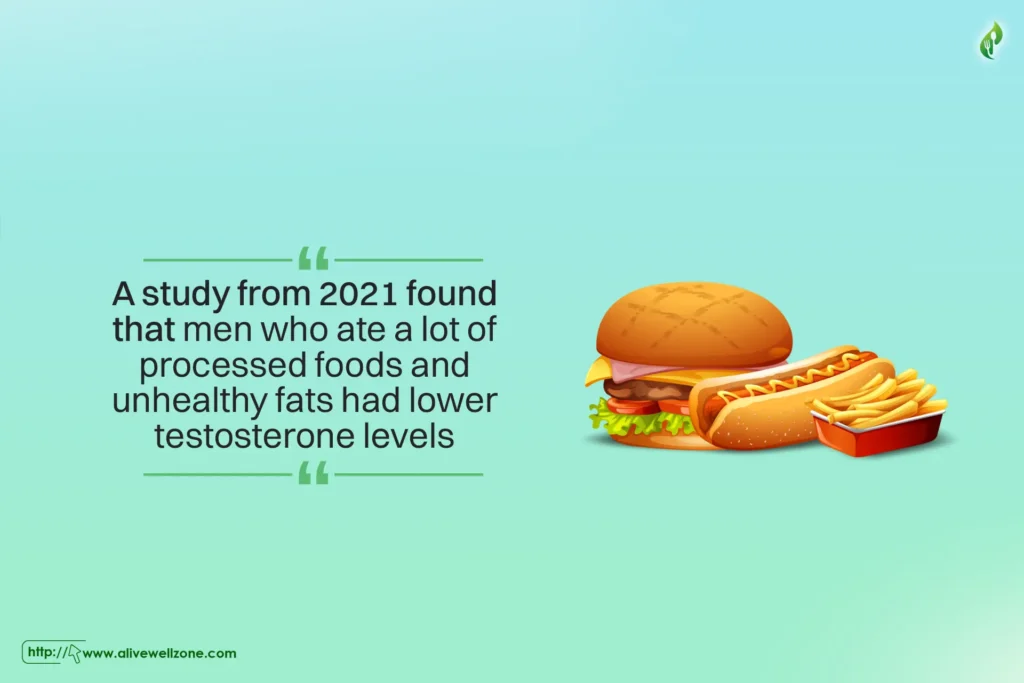
Other Factors That Can Lower Testosterone
Besides the foods that can lower testosterone, several other factors can decrease this hormone’s levels in your body:
- Age: As you get older, especially after 35, your 2% testosterone levels naturally go down. That’s because your testicles and a part of your brain called the HPA axis don’t work as well.
- Stress: Being stressed a lot can lower your testosterone. This is because stress makes your body produce more cortisol, which can stop your body from making testosterone.
- Not being active: If you don’t exercise regularly, you’re more likely to become overweight, which can lower your testosterone. Exercise can help you stay at a healthy weight and keep your testosterone levels up.
- Hypothyroidism: If your thyroid gland doesn’t work well, it can make your testicles produce less testosterone.
- Some medications: Certain medicines can lower your testosterone, like opioids, metoclopramide, and some antidepressants.
- Type 2 Diabetes: If you have type 2 diabetes, your testosterone levels are more likely to be low.
While lifestyle changes can help, they might not fix all testosterone problems. If you’re worried about your testosterone levels, talk to your doctor.
Signs and Symptoms of Low Testosterone
When your testosterone levels drop, it can affect many parts of your body. Testosterone helps with sperm production, sex drive, red blood cell production, and strong bones.
If you don’t have enough testosterone, you might have some problems. So, here are some common signs of low testosterone —
- Less interest in sex
- Losing hair
- Smaller testicles
- Hot flashes
- Problems getting or keeping an erection
- Fewer sperm
- Gaining weight
- Trouble concentrating
- Feeling tired all the time
- Feeling sad
If you notice any of these signs, try changing your diet and see your doctor. They can help you figure out if your testosterone is low and what to do about it.
How to Increase Testosterone Naturally
Testosterone levels can go down as you get older. However, they can also be affected by your health, weight, how active you are, and other health problems. While you can’t stop getting older, you can do things to help your testosterone levels.
If your testosterone is really low, you might need hormone replacement therapy (HRT). But there are also natural ways to help your testosterone:
- Eat the right foods: Some foods, like ginger and bananas, can help boost testosterone.
- Exercise: Studies have shown that exercising regularly, even if it’s just a little bit, can help increase your testosterone and growth hormone levels.
- Get enough sleep: Studies show that sleeping less than five hours a night can lower your testosterone by 15%.
- Watch your weight: Being overweight can lower your testosterone. Eating smaller portions can help you stay at a healthy weight.
If you’re worried about your testosterone levels, the best way to know for sure is to get tested.
Final Words
So, what are foods that kill testosterone? We’ve explored a range of dietary choices that can negatively impact your testosterone levels.
From sugary drinks and processed foods to soy products and excessive caffeine, these culprits can disrupt your hormonal balance. Remember, it’s not just about avoiding these harmful foods.
Incorporating testosterone-boosting foods like lean proteins, healthy fats, and fruits into your diet is equally important. You can achieve optimal testosterone levels and a more vibrant life by making informed choices.
FAQs
Does coffee lower testosterone?
Yes, coffee can influence testosterone. Studies show that caffeine intake, especially before exercise, can boost testosterone levels by up to 14%. However, it also raises cortisol levels, with increases ranging from 21% to 44%, which may counteract some benefit
Are grapes good for testosterone?
Yes, grapes, especially red ones, can support testosterone levels. They contain phytochemicals that reduce estrogen absorption, which can help balance hormones. It is especially beneficial for men who have low testosterone.
How does a man feel with no testosterone?
Low testosterone can lead to emotional shifts, including depression and sadness. Men may struggle with focus, memory, and motivation, alongside a drop in self-confidence. These emotional changes often accompany the physical symptoms of low testosterone.
Does nicotine affect testosterone levels?
Nicotine’s effect on testosterone is unclear. Research offers mixed results: some studies show no impact, others report higher testosterone in smokers, while some find the opposite. A meta-analysis suggests that smokers might have slightly higher testosterone levels than non-smokers.

